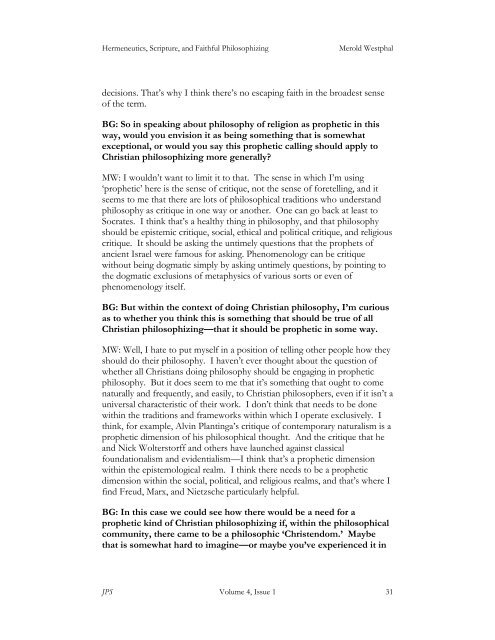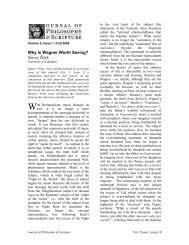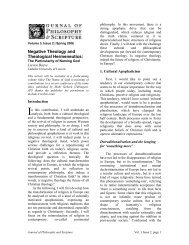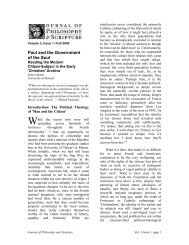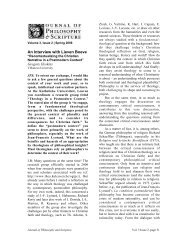interview with Merold Westphal - Journal of Philosophy and Scripture
interview with Merold Westphal - Journal of Philosophy and Scripture
interview with Merold Westphal - Journal of Philosophy and Scripture
You also want an ePaper? Increase the reach of your titles
YUMPU automatically turns print PDFs into web optimized ePapers that Google loves.
Hermeneutics, <strong>Scripture</strong>, <strong>and</strong> Faithful Philosophizing <strong>Merold</strong> <strong>Westphal</strong><br />
decisions. That’s why I think there’s no escaping faith in the broadest sense<br />
<strong>of</strong> the term.<br />
BG: So in speaking about philosophy <strong>of</strong> religion as prophetic in this<br />
way, would you envision it as being something that is somewhat<br />
exceptional, or would you say this prophetic calling should apply to<br />
Christian philosophizing more generally?<br />
MW: I wouldn’t want to limit it to that. The sense in which I’m using<br />
‘prophetic’ here is the sense <strong>of</strong> critique, not the sense <strong>of</strong> foretelling, <strong>and</strong> it<br />
seems to me that there are lots <strong>of</strong> philosophical traditions who underst<strong>and</strong><br />
philosophy as critique in one way or another. One can go back at least to<br />
Socrates. I think that’s a healthy thing in philosophy, <strong>and</strong> that philosophy<br />
should be epistemic critique, social, ethical <strong>and</strong> political critique, <strong>and</strong> religious<br />
critique. It should be asking the untimely questions that the prophets <strong>of</strong><br />
ancient Israel were famous for asking. Phenomenology can be critique<br />
<strong>with</strong>out being dogmatic simply by asking untimely questions, by pointing to<br />
the dogmatic exclusions <strong>of</strong> metaphysics <strong>of</strong> various sorts or even <strong>of</strong><br />
phenomenology itself.<br />
BG: But <strong>with</strong>in the context <strong>of</strong> doing Christian philosophy, I’m curious<br />
as to whether you think this is something that should be true <strong>of</strong> all<br />
Christian philosophizing—that it should be prophetic in some way.<br />
MW: Well, I hate to put myself in a position <strong>of</strong> telling other people how they<br />
should do their philosophy. I haven’t ever thought about the question <strong>of</strong><br />
whether all Christians doing philosophy should be engaging in prophetic<br />
philosophy. But it does seem to me that it’s something that ought to come<br />
naturally <strong>and</strong> frequently, <strong>and</strong> easily, to Christian philosophers, even if it isn’t a<br />
universal characteristic <strong>of</strong> their work. I don’t think that needs to be done<br />
<strong>with</strong>in the traditions <strong>and</strong> frameworks <strong>with</strong>in which I operate exclusively. I<br />
think, for example, Alvin Plantinga’s critique <strong>of</strong> contemporary naturalism is a<br />
prophetic dimension <strong>of</strong> his philosophical thought. And the critique that he<br />
<strong>and</strong> Nick Wolterstorff <strong>and</strong> others have launched against classical<br />
foundationalism <strong>and</strong> evidentialism—I think that’s a prophetic dimension<br />
<strong>with</strong>in the epistemological realm. I think there needs to be a prophetic<br />
dimension <strong>with</strong>in the social, political, <strong>and</strong> religious realms, <strong>and</strong> that’s where I<br />
find Freud, Marx, <strong>and</strong> Nietzsche particularly helpful.<br />
BG: In this case we could see how there would be a need for a<br />
prophetic kind <strong>of</strong> Christian philosophizing if, <strong>with</strong>in the philosophical<br />
community, there came to be a philosophic ‘Christendom.’ Maybe<br />
that is somewhat hard to imagine—or maybe you’ve experienced it in<br />
JPS Volume 4, Issue 1 31


